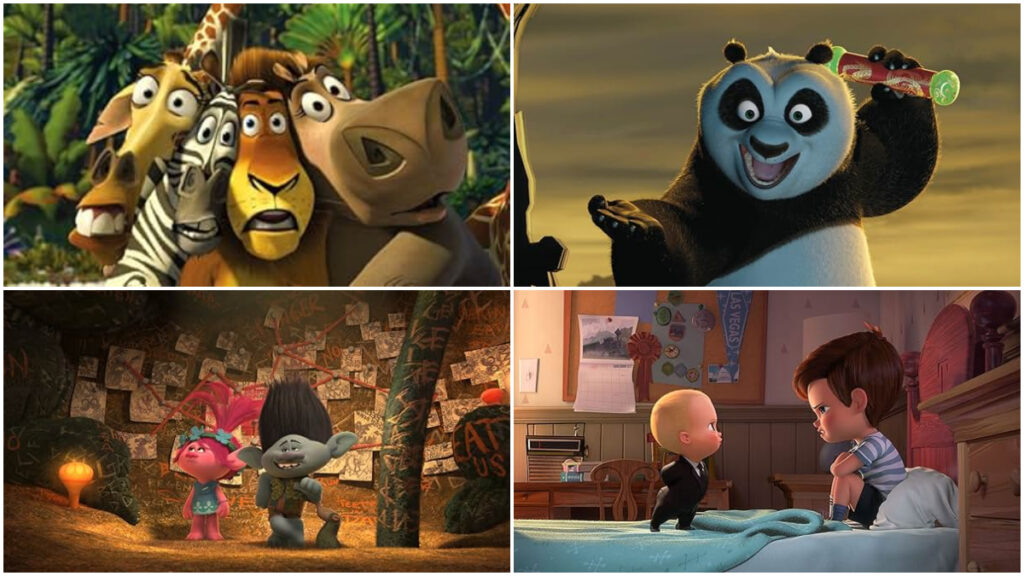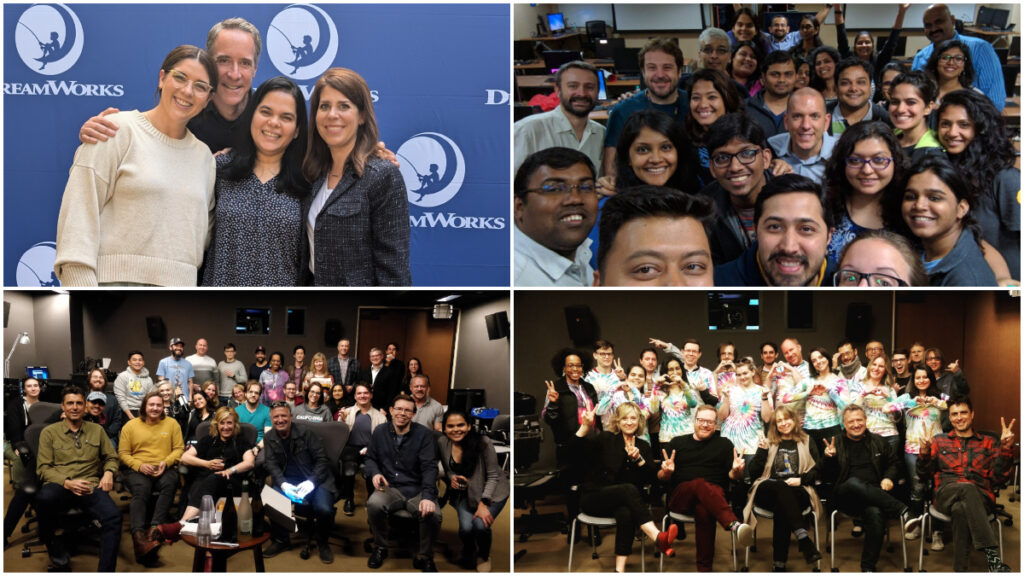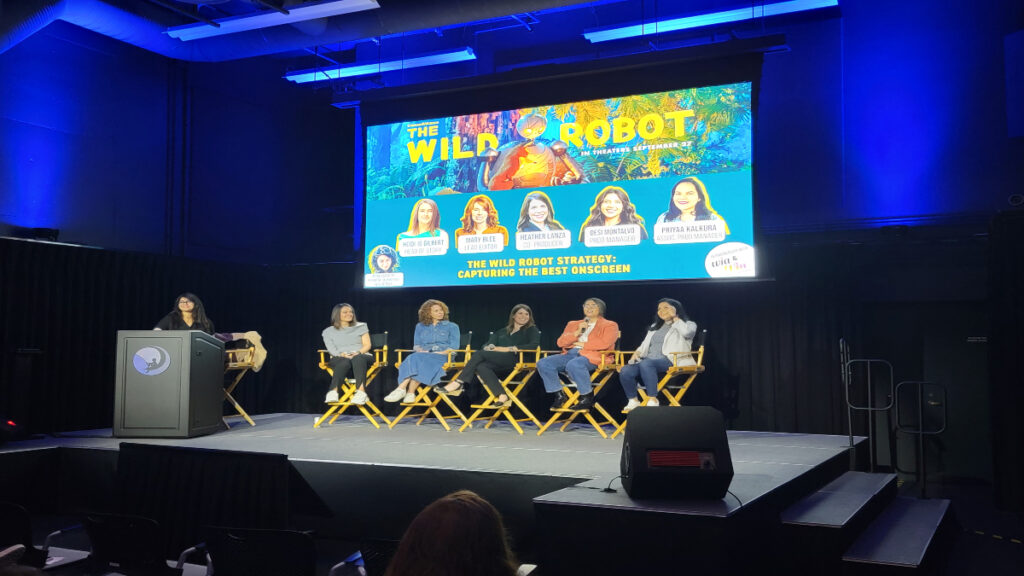She has been part of some of DreamWorks Animation’s most cherished films like Madagascar, How to Train Your Dragon, Kung Fu Panda, Trolls and Boss Baby. Most recently, she served as the associate production manager for the award-winning movie The Wild Robot. As a production person she finds immense joy in working with artists to facilitate the creative process for movies. Over the years, she has been part of industry panels to encourage anyone and everyone who is interested in the animation industry. Nothing brings her greater joy than seeing someone finally get an opportunity to get their foot in the door.
We are talking about Priyaa Kalkura, who has worked in feature animation production for the past 12 years.
Kalkura did her bachelors in electronic media where she studied animation after which she went on to do her masters in film studies from the University of Sydney. Shortly after graduation, she started as a production assistant on the movie Puss in Boots at DreamWorks Animation, India and from there, worked up the ladder from production coordinator, production supervisor to associate production manager. Currently, she is the production manager at DreamWorks Animation, Glendale in California, USA.
In an interview with AnimationXpress, she talks about her role in animation production, her journey in the industry and her newfound passion for mentorship to aspiring filmmakers.
What does your role as a production person entail?
As a production person, I work closely with artists to help facilitate the creative process for movies. As a production manager, my favourite parts of the job are setting up the production for success with proper organisation, mentorship and training for production staff, and maintaining a people first management mindset. My end goal is to help creatively produce meaningful movies that will reach a larger audience.
How has your journey been in animation production?
I began my career as a production assistant at DreamWorks, excited to work for a top animation studio. I discovered a passion for scheduling and managing artists, something I never anticipated. I started as a production assistant in India and later moved to the USA. I briefly worked at Blur Studios on Love, Death and Robots as a production coordinator before returning to DreamWorks as a production supervisor. Despite experiencing imposter syndrome, the guidance and support of my mentors made the transition from coordinator to supervisor, and eventually a manager.
Can you tell us about your role on The Wild Robot movie, and how it was different from other projects you have worked on?
I interviewed for and was offered the associate production manager position for The Wild Robot movie during my maternity leave. This new role significantly expanded my responsibilities. As a production supervisor, my focus was on overseeing the daily operations of one or two departments. However, as an associate production manager, my purview broadened to include managing multiple departments simultaneously, such as art, modeling, look development, matte painting, FX, CFX, and lighting. In addition to departmental management, my new responsibilities also encompassed assisting with marketing requests. This meant collaborating with the marketing team to provide necessary assets and information for promotional materials.
Furthermore, my role included mentoring production supervisors, guiding departmental strategies, helping them to navigate challenges and optimising their workflows. I also worked closely with the production manager and partnered with the VFX supervisor to support broader show-related goals, ensuring that all departments were aligned and working efficiently towards the overall vision for the film.
How has your experience been at DreamWorks Animation?
It has been an absolutely incredible experience that fills me with gratitude every single day. The studio truly fosters a family-like environment, where I have the privilege of collaborating with some of the most exceptionally talented artists in the industry. This combination creates an atmosphere that’s always buzzing with excitement and anticipation, making me eager to jump out of bed and head to work each morning.
It truly is a dream job, and I consider it to be one of the most significant accomplishments in my career. The sense of camaraderie, the shared passion for animation, and the overall positive energy are things that I truly cherish.
How important is it for a production manager to be updated with the latest technology?
In my role at DreamWorks Animation, staying ahead of the curve when it comes to technological advancements is not just important—it’s imperative. My responsibilities include overseeing the entire production process, from pre-production to post-production, and ensuring that the projects are completed on time and within budget. To do this effectively, I need to have an in-depth understanding of the studio’s vast array of tools and software. This knowledge allows me to anticipate potential technical challenges that artists might encounter during the film production process and factor them into the production schedule.
Moreover, I work closely with the studio’s technical directors to proactively identify and address any technical issues that may arise during production. This collaborative approach ensures that we can quickly find solutions and minimise any disruptions to the production workflow. By maintaining open communication with the technical directors and other key stakeholders, I can make informed decisions about resource allocation, task prioritisation, and risk management.
Additionally, my role requires me to stay informed about emerging technologies and industry trends. This involves attending conferences, workshops, and other professional development events, as well as networking with other industry professionals. By keeping my finger on the pulse of the latest technological developments, I can identify opportunities to leverage new tools and techniques to enhance the studio’s production capabilities and maintain its competitive edge.
Which was your most challenging project in terms of production?
The most challenging project was Boss Baby, despite each show having its own difficulties. Although we completed the highest number of sequences in India for this movie, it coincided with NBC Universal closing DreamWorks India office. This resulted in low morale amongst the team, especially at the end of the project. Even though the studio was about to close, the team remained professional and completed all the sequences with a lot of hard work. We tackled the situation by being understanding and giving the artists space to work on their shots, while also trying to help them figure out their lives after the show.
What would be your advice to aspiring animation filmmakers?
Staying current in fast-paced industries requires continuous learning. This boosts your skills, adaptability, and problem-solving, allowing you to seize opportunities and navigate changes confidently. Learning from experienced mentors and communities provides invaluable insights and support for career growth.
How does the journey look ahead for you?
While being a mentor and focusing on producing, I want to step into consider myself a creative. There are so many diverse stories that are untapped. So many perspectives we have not heard. This is why I want to become a creative producer in the long run. I’m excited to be the mentor or sponsor I had, to someone else. I’m excited to be a part of this next generation of filmmakers who are dismantling the normal and I hope that this inspires others to do the same.
Which is your personal favourite animated movie?
The Kung Fu Panda series are my absolute favourites, especially the first one! The characters are fantastic, and some of the villains are incredibly well-developed. I love how Po’s relationship with Shifu and the Furious Five grows throughout the first movie, especially during the scene where they compete over a dumpling. The movies deliver powerful lessons that we can apply in real life. Po’s character development is amazing; he eventually learned to believe in himself.
Before we wrap up, can you tell us what is next in the pipeline for you?
I’m currently a production manager on an unannounced project that I will be able to share with the world in a few years.




